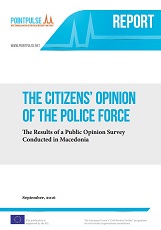2016 THE CITIZENS’ OPINION OF THE POLICE FORCE - The Results of a Public Opinion Survey Conducted in Macedonia
2016 THE CITIZENS’ OPINION OF THE POLICE FORCE - The Results of a Public Opinion Survey Conducted in Macedonia
Author(s): Magdalena Lembovska
Subject(s): Politics / Political Sciences, Politics, Civil Society, Security and defense
Published by: BCBP Beogradski centar za bezbednosnu politiku
Keywords: police force; North Macedonia; police sector; public opinion
Summary/Abstract: The police are the most trusted institution in Macedonia with almost 60% of the respondents stating that they mostly or completely trust it. Still, nearly one-quarter of the population do not trust the police at all. In general, women tend to trust them more than men, whereas males are the demographic group with least confidence in this institution. Citizens are also divided among the ethnic lines. Ethnic Macedonians generally express more positive views than ethnic Albanians, particularly concerning the question of trust. Moreover, the level of trust is the highest among the public sector employees, followed by pensioners and those working in the private sector. The students’ and unemployed citizens’ level of trust is much lower. Macedonian citizens have a positive perception of police officers, describing them mainly using positive words/adjectives, and with female police officers scoring slightly better. However, negative perceptions prevail in many aspects of the work of the police. For instance, the most popular belief about the employment process within the police is that candidates are selected via political connections or by pulling strings with relatives or friends. Moreover, the police force is rather seen as operating as means for protection of the interests or particular groups than as a service of the citizens. In line with this finding, more than half of the citizens believe that politicians do have an influence on the operating work of the police force. Apart from the police, only education and healthcare received positive trust assessments by more than half of the respondents, while least trusted institutions are the judiciary, the Anti-corruption Agency, the prosecutors’ offices and the Parliament. Moreover, all institutions except non-governmental organisations are considered by more than half of the respondents to have widespread corruption. The most widespread corruption is perceived to be found in the judiciary, followed by the prosecutors’ offices, commercial inspectorates and the customs. Compared to other institutions, the police is positioned somewhere in the middle. Breaking down the results to specific police units, the traffic police is considered to be the most corrupt, followed by the Minister’s closest associates and the border police. The least corrupt are believed to be police officers responsible for public law and order. On a positive note, it is encouraging to see that 76% of the Macedonian citizens would be willing to report a case of corruption in the police (being asked for a bribe), even if they were required to reveal their personal data. This is in line with the popular belief that motivating citizens to report corrupt police officers is the most necessary action for preventing corruption. Other suggested measures are: increasing the salaries of police officers, strict sanctioning of offenders and more frequent punishing of corrupt police officials. The internal control unit, responsible for addressing corruption within the police, is not the citizens’ first choice for reporting a case. Most of the citizens would report it to the local police station or the chief of the station. Similarly, the institution that should be the first to fight corruption in the police force is considered to be the police force itself through the control of the police, by the minister of interior, or the police officers themselves. On the other side, citizens mainly agreed that the primary role of the NGOs in the fight against corruption should be collaborating with the state.
Series: BCBP - Assessment of Police Integrity
- Page Count: 42
- Publication Year: 2016
- Language: English
- Content File-PDF

